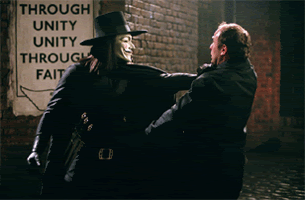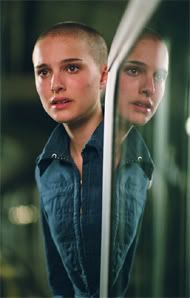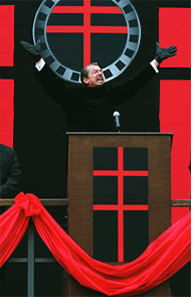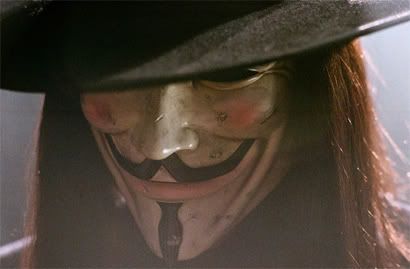If the lives of your compatriots were threatened by some outside force, would you give up some of your rights to feel safe? Or do you agree with Benjamin Franklin that, “They who would give up an essential liberty for temporary security, deserve neither liberty nor security”? This is the world the British, as a result of their fear, have resigned themselves to in V for Vendetta. And in a complacent dystopia ruled by fascists, the only way to start a revolution is to incite chaos.
Vendetta is one of the most brilliant movies I’ve seen in a long time. It’s a no holds barred action flick -- full of explosions and blood -- that actually forces it’s viewers to think. After a masked man (known only as “V”) rescues Evey Hammond (our leading lady) from a group of would-be-rapist police officers,  Evey is swept up in V’s world of vigilantist vengeance, which she is initially reluctant to take part in. V models his actions after those of the infamous Guy Fawkes and, in classic comic book style, wears a Guy Fawkes mask through the entire movie to hide his disfigured face. V, like Fawkes, aims to blow up parliament in an act of defiance and as an attempt to incite a once complacent people to revolution and self-government. The meeting of two opposite people, like V and Evey, presents occasions for learning and discovery – for one, principle, and for the other, love.
Evey is swept up in V’s world of vigilantist vengeance, which she is initially reluctant to take part in. V models his actions after those of the infamous Guy Fawkes and, in classic comic book style, wears a Guy Fawkes mask through the entire movie to hide his disfigured face. V, like Fawkes, aims to blow up parliament in an act of defiance and as an attempt to incite a once complacent people to revolution and self-government. The meeting of two opposite people, like V and Evey, presents occasions for learning and discovery – for one, principle, and for the other, love.
If Star Wars has been your only test of Natalie Portman’s skill, you have been greatly deceived. Portman’s grip on Evey Hammond is so solid that after they initial, “Hey, that’s Natalie Portman,” you won’t think of her again. Evey has a difficult and substantial character arc, but Portman handles it with consummate skill. She takes Evey from a young woman deathly afraid of admitting she has principles -- let alone the ability to act on them -- to a woman who, having been broken in everyway possible, becomes V’s fearless ally.  It is both a testament to Portman’s skill and the excellence of the writing that this transformation doesn’t seem unnatural.
It is both a testament to Portman’s skill and the excellence of the writing that this transformation doesn’t seem unnatural.
The real star of this film, of course, is Hugo Weaving as the mysterious V, who never comes out from behind his Guy Fawkes mask. The fact that we never see his face doesn’t at all take away from Weaving’s performance. Somehow he conveys everything he needs to with body language and his mellifluous and resonating voice. His body language somehow never seems forced, but it flows with the intent of the words, much like one’s face does. With a slight cock of his head, you just know V is raising his eyebrow. And with his voice, Weaving can make the mask seem at times terrifying, sometimes jocular, and other times pitiful. A truly masterful performance.
The supporting cast is likewise flawless. John Hurt’s Chancellor Sutler is an insidiously terrifying character. Stephen Rae brings depth to Inspector Finch where other, less careful actors might be tempted to make him into a cardboard cutout. All the villains, all the good guys, and all those astonished citizens make this movie more than just an action flick.
Vendetta’s script itself is a well-crafted and gripping piece of work, but a movie is far more than a script and a more-than-capable cast and crew bring it to life in a marvelous fashion. The art directors bring us some striking visuals with a color palette that really fits the mood of the piece. From the black of V’s wardrobe and the Scarlet Carsons he leaves on his victims to the emblem on Britain’s new flag, to the blood slinging from the necks of V’s victims, black and red dominate. But metallics and earth tones also play their role, contrasting the dystopian order of the fascist government and the stone underground of V’s lair, with its collection of wrongfully-censored art. The soft colors of V’s world make it easier for the mind to sympathize with the borderline terrorist, especially when compared to the glaring and harsh world of the government.
world of the government.
The film is teaming with the intersecting themes of coincidence and truth, justice and vengeance, complacency and corruption. Is there really such a thing as coincidence, or is it just the illusion of coincidence? If it’s just the illusion of coincidence, then is some greater power trying to tell us something through this illusion? Are those who think they see the point of the illusion, like V, justified in using methods commonly associated with terrorism to get others to understand the truth? Or is this merely vengeance? Did the British government justly reap this vigilante harvest by sowing the seeds of terror and corruption? What about the complacent people? If V punished the British government for their actions, was not the government a punishment for the people’s complacency? Is our own America complacent? Could the republic we (used to) take pride in turn out this way? Do we even care anymore?
I have only two reservations about this film: its blatant attempt at over-sympathizing homosexuality and its failed attempt at convincing me the fascists are extreme right-wingers. Instead of the excessive mentioning of the plight of homosexuals under this government, the celluloid could have been used to better effect showing the plight of Muslims, Jews, non-Caucasians, non-British folks, or any of the other oppressed groups in order to show the sweeping arrogance and elitism of the government. Additionally, trying to convince viewers that a fascist government is the inevitable result of a right-wing takeover is so completely illogical that not even Hollywood could pull it off. So many of the choices made by those in power are choices that necessarily follow the nihilism dominant in left-wing circles and could never be logically made by a conservative. But don’t let those minor annoyances stop you from seeing Vendetta.
Near the beginning of the film, Evey, quoting her father, makes a mournfully true statement, “Artists use lies to tell the truth while politicians use them to cover the truth up.” Some of the lies artists tell are badly told, weather visually or on the written page, but this is not the case in V for Vendetta. This is an excellent movie, not to be missed.


I've often thought of myself as one who is underestimated by those who know me, at least as far as my writing ability is concerned. I stand, however, on the opposite side of that now, as I just never knew you could write like that. Bravo. And I agree with the points you raised, as well. Nazi stands for National Socialist, and Liberalism and socialism are dangerously close to being synonomous. I'd enjoy a conversation with you on this topic at some point.
ReplyDelete